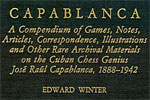


ChessBase 17 - Mega package - Edition 2024
It is the program of choice for anyone who loves the game and wants to know more about it. Start your personal success story with ChessBase and enjoy the game even more.
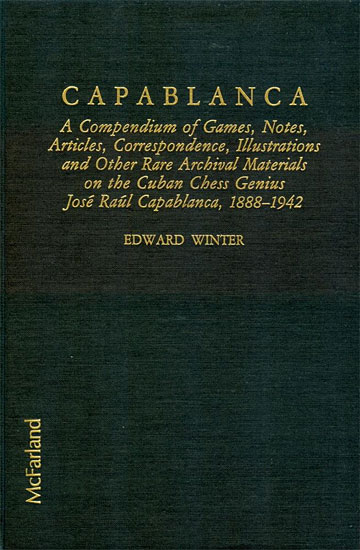
Capablanca – A Compendium of Games, Notes, Articles, Correspondence, Illustrations and Other Rare Archival Materials on the Cuban Chess Genius José Raúl Capablanca, 1888-1942 by Edward Winter was originally published by McFarland & Company, Inc. as a hardback, in 1989, and a paperback edition has just been issued. Since the book's first appearance the critics have raved about it. A previous ChessBase article called it "simply unmissable" and quoted praise from, among others, Nigel Short, Yasser Seirawan and Olga Capablanca Clark. Here is a further assessment, by Jeremy Silman, who is the author of such bestsellers as How To Reassess Your Chess (now in its fourth edition):
"Edward Winter's brilliant book Capablanca stripped the fluff from the third world champion's legend, letting long-forgotten facts separate man from myth and showing that, at times, the actual man was far greater than the myth would have us believe. By humanizing someone who was always deemed larger than life, and was idolized by chessplayers and non-chessplayers alike, Edward Winter, the world's greatest and most respected chess historian, has given us a piece of literature that has become a legend unto itself, and is universally viewed as one of the greatest books ever written about chess."
Yet Edward Winter himself has said little on the subject, preferring to let his work speak for itself. Now, though, we've coaxed him into describing how the volume came about and what he aimed to achieve.
Edward Winter writes:
"Work on Capablanca began in the mid-1980s. At that time, most of the major chess languages had at least one annotated games collection on him, usually beginning with a game or two from the 1901 Corzo match and ending with Capablanca v Czerniak, Buenos Aires, 1939. There was a huge amount of overlap in those books. In some respects, 'overlap' is a euphemism, of course.
So I decided on a rather novel approach. All that common knowledge – including the contents of Capablanca's own books and the excellent research undertaken in the Capablanca works by Gilchrist and Hooper (1963) and Hooper and Brandreth (1975) – would be taken more or less as read. My book would carry the story on from there. In this way, ideally, every page would contain material that the reader had never seen before. As regards games, for example, I found quite a few good ones which had not previously appeared in book form. Capablanca's tournament and match games were omitted unless I could provide his own annotations from little-known sources.
A main priority was to quote, in full, Capablanca's surprisingly large number of articles and interviews in newspapers and magazines, as well as significant specimens of his correspondence. I believe in what may be termed the 'quotation school of chess history'. Quotation is a fine way of bringing the reader as close as possible to historical reality, with proper context and perspective. Capablanca's own words are, to me, infinitely more interesting than other people's about him (which often contain a large dose of waffle). My own commentary was kept to a minimum, concentrating on factual matters and context, as opposed to value judgements. Whenever possible, I prefer to give readers the facts and allow them to form their own opinions. The chips are left to fall wherever they may.
I wanted to achieve a balance between setting out events from Capablanca's own point of view, whenever relevant texts existed, and ensuring that the reader was given enough information from other sources 'to avoid any suggestion that Capablanca won every argument', as the Preface put it. Naturally there are many instances when it is appropriate for me to offer evaluations, but these are given with as light a touch as possible. And hero-worship does not enter into consideration.
Facts and quotes have to be substantiated with precise references. No other approach is possible if a bond of trust is to exist between author and reader, and the reader must never be left wondering with regard to the author, 'Where did he get that from?' Sources are not optional extras. I am sometimes teased for systematically wishing to give sources (in footnotes, endnotes, etc.) for more or less everything, but that is a small price to pay for ensuring that the reader can, if he wishes, verify anything that has been written by me. I do not like paraphrasing, because it almost inevitably leads to corner-cutting, and truth suffers.
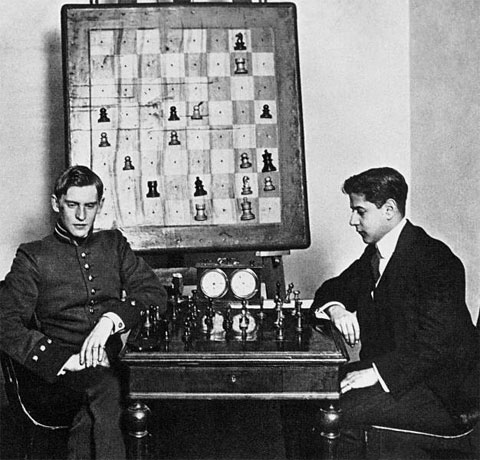
Playing Alekhine, St Petersburg, 1913
Detail is essential. Writing a book replete with opinions and broad-sweep generalizations, on Capablanca or another historical subject, would be far too easy. It requires no vision or imagination, and no chess historian, I suggest, would be interested in adopting that approach. Where is the satisfaction for either the author or the reader?
Of course, there are thorny historical issues, unresolved at least for now. For instance, no consensus exists among historians on the exact rights and wrongs of the Capablanca v Alekhine rematch controversy, which has a 35-page chapter in my book. As mentioned in the Preface, my analysis may best be considered a pioneering effort; there is probably much further documentation to be discovered. 'Alekhine dodged Capablanca' is a bold assertion often found in so-called popular chess books as though it were an established fact. If my Capablanca book, or my writing in general, helps to advance the idea that such glib summaries are valueless, so much the better.

Capablanca's score of the 32nd match game against Alekhine, 1927
Many other Capablanca issues have fors and againsts which could be debated endlessly, although the likely benefits are slight. For example, how good a writer was he? His writings have been both extolled and lambasted, but this is another area where my broad preference is to concentrate on presenting the evidence (his long-lost texts) and leave readers to judge for themselves. By offering quite a large number of forgotten articles and previously-unpublished correspondence, my Capablanca work aimed to bring together sufficient evidence for a more rounded view of him. His writings, public and private, show his exceptional truthfulness (I am not aware that he ever wrote a lie), although he sometimes lacked rigour concerning facts, and not least about his own career. He could be casual. And, for a diplomat, he was surprisingly undiplomatic on a few occasions.

José Raúl Capablanca
Some of Capablanca's letters show that he was not averse to a little gossip, contrary to the public perception of his aloofness. Even so, his reserved character means that the personal revelations are not as numerous as might be hoped. Sometimes he discussed his ill-health, and my book suggests that his physical suffering, in the last 10-15 years of his life, was worse than commonly thought. On personal matters, however, he was not one to pour out his heart. I say very little about his so-called womanizing mainly because I know very little about it. To read the output of some authors endowed with only a patchy command of the basic facts of Capablanca's life, one might imagine that firm evidence exists about his romantic adventures at, say, St Petersburg, 1914 and Buenos Aires, 1927, but nothing specific is ever offered.
It is obviously not the role of the 'non-playing historian', for want of a better term, to pronounce on the technicalities of how one of the all-time greats played chess, whether in terms of the detail of individual games or his overall style. On such matters my deference to knowledgeable masters is immediate and total. And even if I were writing a Capablanca book not in 1989 but today, when so many strong computer programs can assist, I would not venture down that path. Only a select handful of writers are in the fortunate position of being both masters and historians. They are very much the exception. The general principle is that historians should evidently not present themselves as masters, any more than masters should present themselves as historians.
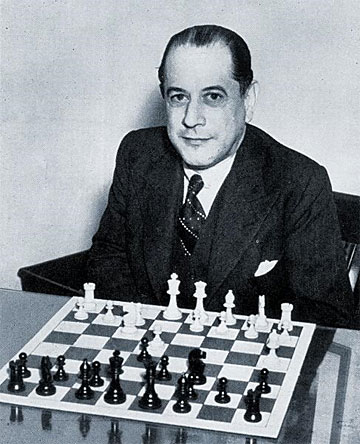
José Raúl Capablanca
The fact that Chess Notes was appearing, in magazine form, in the mid-1980s helped the Capablanca book, because some material could be 'tested' as C.N. items. The magazine's existence brought me into contact with many correspondents whose help proved invaluable. Above all, mention should be made of Mr Rob Verhoeven of the Royal Dutch Library in The Hague. I also exchanged dozens of letters and telephone calls with Capablanca's widow, Mrs Olga Capablanca Clark, and these provided innumerable insights into his character and personality. There were transatlantic calls that lasted for an hour or even considerably more. Most monographs on Capablanca have very little material from his native country, Cuba, and that was a major gap which my book could not ignore. So in 1986 I went to Havana for research purposes. It was a leap in the dark but proved very fruitful, thanks to the fine assistance of the staff of the José Martí Library. 'Leap in the dark' may also be, to some extent, an apt description of McFarland & Company, Inc.'s decision to commission my book, at a time when it was infinitely more difficult for works on chess history to interest a publisher than it is today. A fairly smooth production process resulted in a most handsome book, whatever the merits or otherwise of the content.
The reviews of Capablanca were gratifying, of course, but I should never dream of suggesting that the volume is in any way 'definitive'. The whole process of helping to take knowledge forward is never-ending. My book tried to put information about Capablanca's life and career on a more solid basis, getting rid of many of the myths about him and offering instead a substantial body of fresh facts. I claim no more than that."
***
Capablanca (price: $35) can be bought from good chess stockists, from McFarland & Company, Inc. and from Amazon.com or Amazon.co.uk. Finally, signed copies are available direct from the author.
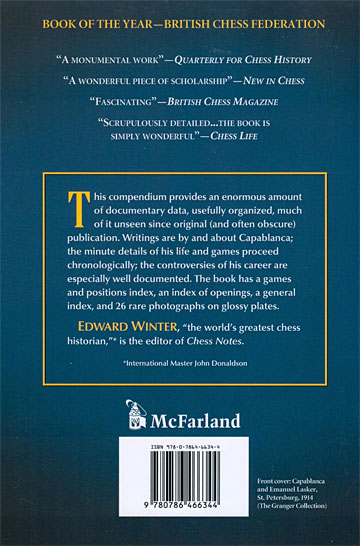
"Undoubtedly one of the best chess books I have read" – Nigel Short